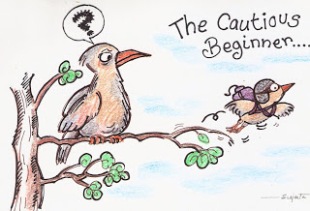I will cover my article in fashion of few pivotal questions which you may have. You have some common questions in your mind and the following part of the article will try to help you solve many, if not all. Here we go!
First of all- Why sociology?
Sociology as a subject is helpful in many ways. A good hold over the subject helps you immensely in handling the social issues in GS as the knowledge comes handy. Even in the essay, there is certainly at least one topic from Sociology. Moreover, the interview also has substantial portion involving social issues and the subject is an asset in such a case. Apart from all these, once you enter the services, a good hold over social realities helps you at all stages. For me, Sociology helped at all these levels to a large extent. As I am an engineer, I can guide you just as much that ensures a good score and performance in the exam. Let us take a look at some more interesting facets.
YOU MAY THINK: Which and how many books to study? How to manage such a huge reference list and how to control such large material?
I THINK:Many people, especially peers, may suggest you to refer multiple books to understand the syllabus. But, I differ and differ for sure. You should try to limit the sources while studying but make sure you do that extensively. There is a small trick to this. The trick is that you study some basic stuff, let’s call it ‘Primary’. The primary material should be NCERT books, some fundamental books like Harlemboss for paper 1 and Y.Singh and R.Ahuja books for paper 2. In addition, you buy the ‘Secondary’ material for reference. But, the secondary material should be used only to refer some difficult issues and for adding value to primary.
Adding value to primary means extracting some thinker’s views, case studies etc. Once you have read the Primary material, you should search and add value from secondary material. You can simply look for any new information, cases and books and add it to your primary material notes. You should not read all the books deeply. Rather, one should read few with depth and then simply all new things from multiple sources. Like this, your answers shall be comprehensive, fresh and with diverse knowledge.
YOU MAY THINK: What should be my writing style? How to write good answers in sociology?
I THINK: Writing style is pivotal in getting good score and writing nice answers. For sociology, the key is to keep the language simple and bountiful. By bountiful, I mean that you should use extensively views of thinkers, case studies, book’s names etc. Unlike a subject like Pub Ad, where you can express your views liberally, in sociology you should use the views and opinions of thinkers and sociologists. This, according to me, makes the answers credible and scoring. But, there is one catch here. You should not add case studies for the sake of adding only. They should be relevant to the answer and should help it like good songs of a great Bollywood movie. Like the songs that take the story forward, your answer should flow naturally with the help of these references etc.
YOU MAY THINK: The syllabus looks huge. How do I study the subject? Moreover, how do I study paper 1 and paper 2 in connected way?
I THINK:The best part of Sociology, according to me, is the linkage between the two papers. One should not study the two papers exclusively but together in an intertwined fashion. Once the syllabus is studied like that, the subject takes less time and effort to master and do well in the exam. Now, I will describe a broad theme for such linkage that helped me and would surely help you as well. To easily control a subject like sociology, I personally categorized the whole syllabus into 8 slots. These 8 slots are independent of paper 1 or 2 and link common topics. Even the questions in the exam ask questions that are linked as in these slots.
Slot 1- INDEPENEDENT TOPICS:
(This contains independent topics which are not much interconnected with other areas and can be studied separately as a slot.)
PAPER-1
1. Sociology – The Discipline:
(a) Modernity and social changes in Europe and emergence of sociology.
(b) Scope of the subject and comparison with other social sciences.
(c) Sociology and common sense.
2. Sociology as Science:
(a) Science, scientific method and critique.
(b) Major theoretical strands of research methodology.
(c) Positivism and its critique.
(d) Fact value and objectivity.
(e) Non- positivist methodologies.
3. Research Methods and Analysis:
(a) Qualitative and quantitative methods.
(b) Techniques of data collection.
(c) Variables, sampling, hypothesis, reliability and validity.
PAPER-2
A. Introducing Indian Society:
(i) Perspectives on the study of Indian society:
(a) Indology (GS. Ghurye).
(b) Structural functionalism (M N Srinivas).
(c) Marxist sociology ( A R Desai).
(ii) Impact of colonial rule on Indian society :
(a) Social background of Indian nationalism.
(b) Modernization of Indian tradition.
(c) Protests and movements during the colonial period.
(d) Social reforms
(iii) Tribal communities in India:
(a) Definitional problems.
(b) Geographical spread.
(c) Colonial policies and tribes.
(d) Issues of integration and autonomy.
(vi)Population Dynamics:
(a) Population size, growth, composition and distribution.
(b) Components of population growth: birth, death, migration.
(c) Population policy and family planning.
(d) Emerging issues: ageing, sex ratios, child and infant mortality, reproductive health.
Slot 2- THINKERS:
PAPER-1
4. Sociological Thinkers:
(a) Karl Marx- Historical materialism, mode of production, alienation, class struggle.
(b) Emile Durkheim- Division of labour, social fact, suicide, religion and society.
(c) Max Weber- Social action, ideal types, authority, bureaucracy, protestant ethic and the spirit of capitalism.
(d) Talcolt Parsons- Social system, pattern variables.
(e) Robert K. Merton- Latent and manifest functions, conformity and deviance, reference groups
(f) Mead – Self and identity.
Slot 3- STRATIFICATION, CASTE AND CLASS:
PAPER-1
5. Stratification and Mobility:
(a) Concepts- equality, inequality, hierarchy, exclusion, poverty and deprivation
(b) Theories of social stratification- Structural functionalist theory, Marxist theory, Weberian theory.
(c) Dimensions – Social stratification of class, status groups, gender, ethnicity and race.
(d) Social mobility- open and closed systems, types of mobility, sources and causes of mobility.
PAPER-2
(ii) Caste System:
(a) Perspectives on the study of caste systems: GS Ghurye, M N Srinivas, Louis Dumont, Andre Beteille.
(b) Features of caste system.
(c) Untouchability – forms and perspectives
(iv) Social Classes in India:
(a) Agrarian class structure.
(b) Industrial class structure.
(c) Middle classes in India.
Slot 4-WORK, ECONOMIC LIFE, AGRICULTURE, INDUSTRY:
PAPER-1
6. Works and Economic Life:
(a) Social organization of work in different types of society- slave society, feudal society, industrial /capitalist society.
(b) Formal and informal organization of work
(c) Labour and society.
PAPER-2
(ii) Rural and Agrarian transformation in India:
(a) Programmes of rural development, Community Development Programme, cooperatives, poverty alleviation schemes.
(b) Green revolution and social change.
(c) Changing modes of production in Indian agriculture .
(d) Problems of rural labour, bondage, migration.
(iii) Industrialization and Urbanisation in India:
(a) Evolution of modern industry in India.
(b) Growth of urban settlements in India.
(c) Working class: structure, growth, class mobilization.
(d) Informal sector, child labour
(e) Slums and deprivation in urban areas.
Slot 5- POLITICS, WESTERN AND INDIAN:
PAPER-1
7. Politics and Society:
(a) Sociological theories of power
(b) Power elite, bureaucracy, pressure groups, and political parties.
(c) Nation, state, citizenship, democracy, civil society, ideology.
(d) Protest, agitation, social movements, collective action, revolution.
PAPER-2
(iv) Politics and Society:
(a) Nation, democracy and citizenship.
(b) Political parties, pressure groups , social and political elite.
(c) Regionalism and decentralization of power.
(d) Secularization
Slot 6- RELIGION, WESTERN AND INDIAN:
PAPER-1
8. Religion and Society:
(a) Sociological theories of religion.
(b) Types of religious practices: animism, monism, pluralism, sects, cults.
(c) Religion in modern society: religion and science, secularization, religious revivalism, fundamentalism.
PAPER-2
(vi) Religion and Society:
(a) Religious communities in India.
(b) Problems of religious minorities.
Slot 7- FAMILY, KINSHIP, MARRIAGE:
PAPER-1
9. Systems of Kinship:
(a) Family, household, marriage.
(b) Types and forms of family.
(c) Lineage and descent
(d) Patriarchy and sexual division of labour
(e) Contemporary trends.
PAPER-2
(v) Systems of Kinship in India:
(a) Lineage and descent in India.
(b) Types of kinship systems.
(c) Family and marriage in India.
(d) Household dimensions of the family.
(e) Patriarchy, entitlements and sexual division of labour.
Slot 8- SOCIAL CHANGE:
PAPER-1
10. Social Change in Modern Society:
(a) Sociological theories of social change.
(b) Development and dependency.
(c) Agents of social change.
(d) Education and social change.
(e) Science, technology and social change.
PAPER-2
(i) Visions of Social Change in India:
(a) Idea of development planning and mixed economy.
(b) Constitution, law and social change.
(c) Education and social change.
(v) Social Movements in Modern India:
(a) Peasants and farmers movements.
(b) Women’s movement.
(c) Backward classes & Dalit movement.
(d) Environmental movements.
(e) Ethnicity and Identity movements.
(vii) Challenges of Social Transformation:
(a) Crisis of development: displacement, environmental problems and sustainability.
(b) Poverty, deprivation and inequalities.
(c) Violence against women.
(d) Caste conflicts.
(e) Ethnic conflicts, communalism, religious revivalism.
(f) Illiteracy and disparities in education.
Ina nutshell, if you study the syllabus in these 10 slots, then it will be easier to revise, make notes and also to answer applied questions. Most of the applied questions nowadays make use of such linkages and studying the subject in this fashion makes the job very easy indeed. This helped me tremendously and I am sure it would be beneficial for you too.


